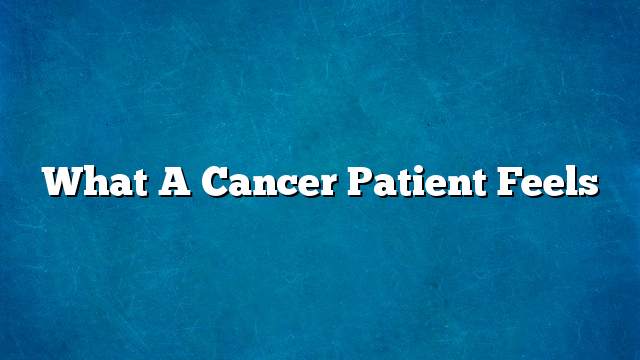Cancer
Cancer is classified as a group of disease cases, which share the increased rate of growth and proliferation of cells of the body, and may even spread these cells to the tissues nearby, and may begin cancer in any cell in the body, whatever its location. In the healthy body grow cells and divide into new cells According to the need of the body, and when these cells grow or damage a certain death and replaced by other new cells. What happens in cancer is a disorder in this organized process. The cells that are supposed to die remain in the body, and new cells are produced without the need for them, and then these new cells proliferate non-stop and this is called the tumor. Cancer cells are characterized by the invasion of surrounding cells and tissues, and can also invade organs away from them by moving their cancer cells through blood or lymph vessels. There are more than 100 types of cancer, usually referred to as the organ or tissue from which they originate. Some cancers may be called according to their cell type, such as epithelial cell tumors.
Symptoms of cancer
Cancer has many symptoms and signs, but may be similar to other diseases, so you should see your doctor when these symptoms exist. Cancer signs may be caused either by affecting the function of the affected organ, by pressing the organs surrounding the tumor, or by spreading it to other organs. The most common symptoms of a cancer patient are:
- Feeling very tired : Although it is common symptom associated with many other diseases, but fatigue may be indicative of the proliferation of cancer cells in the body, and it appears when there is a tumor in the colon.
- Extreme and unexplained weight loss : Any loss of weight if it is sudden or without a known cause of the occurrence is considered serious and may indicate the incidence of cancer.
- Breast changes Breast tumors are one of the most common tumors in women. Fortunately, most of them are benign; however, attention should be paid to any change in the breast; such as changing the skin surrounding the breast to become red or red, or discharge from the nipple, .
- Changes in output : Such as diarrhea or severe constipation, especially if the patient suffers from sudden and continuous, or that the patient feels frequent gas in the abdomen, or severe abdominal pain. All of these symptoms may indicate a tumor in the colon. Colonoscopy is recommended regularly after the age of 50.
- The sensation of constant bloating : Especially in women, although the abundance of gases is normal for them, if continued for a long time did not respond to treatment, or if accompanied by weight loss or bleeding, may be an indicator of ovarian cancer.
- Bleeding in non – menstrual cycle : There are many reasons to see a doctor in case it occurs; it may be accompanied by cancer of the lining of the uterus. It should be noted that it is important to see a doctor in case of vaginal bleeding in postmenopausal women.
- Bleeding from the anus : Although there are more common causes of anal bleeding such as hemorrhoids, prolonged bleeding, or anemia with severe bleeding, may be an early sign of rectal cancer.
- Changes in the skin : If the size, color, or shape of an existing mole changes, or new patches appear on the skin.
- Changes when urinating There are certain symptoms that may indicate prostate cancer, such as urinary incontinence, urine leakage, inability to urinate despite need, or difficulty urinating. Prostate cancer is more common in patients over 60 years of age. Blood with urine may be associated with bladder or kidney cancer.
- Changes in lymph nodes : Doctors are usually advised to review if the patient notice the emergence of any swelling or tumor in the body, regardless of location or size, these may be bulges lymph nodes enlarged. Lymph nodes are small lumps in the entire body that protect them from infection. Inflammation is usually a sign of inflammation or infection, and may also increase or increase in size in leukemia or lymphoma.
- Persistent pain in the back , This may be indicative of the spread of cancerous tumor to the spine.
- Continuous cough , Especially if accompanied by the exit of blood, the injury may be caused by lung cancer.
- Difficulty swallowing : It may indicate, if repeated several times, the incidence of cancer of the stomach or esophagus, specifically if accompanied by severe ejaculation.
- Continuous body temperature rise And the lack of response to drugs, as it may be accompanied by a cancer in the blood.
Cure cancer
The treatment of cancer depends on many factors, such as the type, the extent of its spread in the body, as well as the age of the patient and his state of public health and others. Cancer does not usually respond to only one type of treatment, and it requires more than one method to eliminate it. Common methods of treating cancer are as follows:
- Surgery : The oldest known methods, and useful in case of non-spread of the disease.
- Radiation : And by shedding a certain amount of high-energy rays in order to destroy the cancer cells.
- Chemotherapy : Using chemical compounds that break down proteins and DNA in cancer cells and work to prevent their reproduction and thus destroy them.
- Immunotherapy : This treatment aims to strengthen the immunity of the patient’s body against the tumor, and be injected with certain compounds in the affected area.
- Gene therapy : The replacement of the genes responsible for the formation of the tumor to another healthy.
